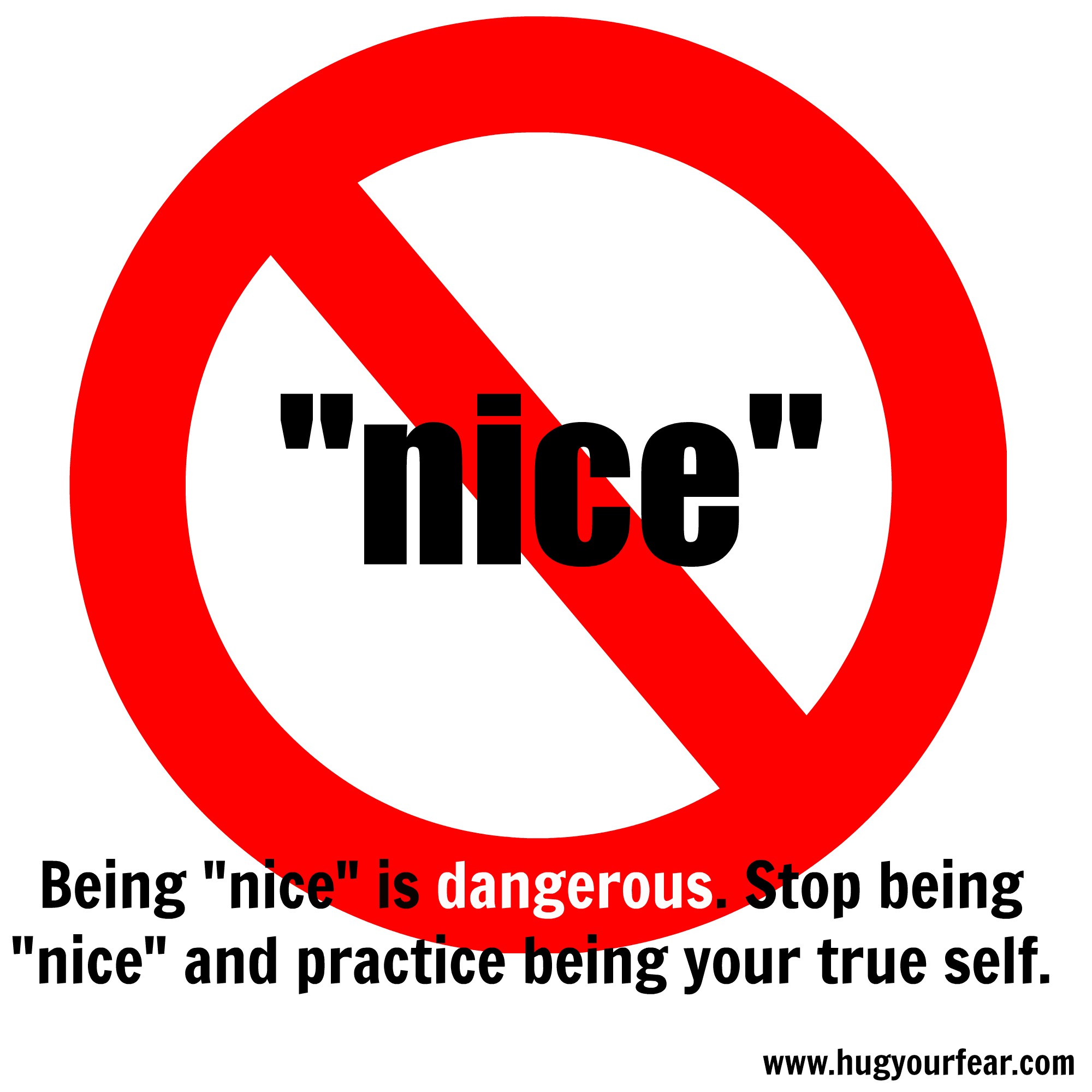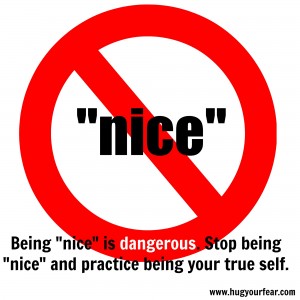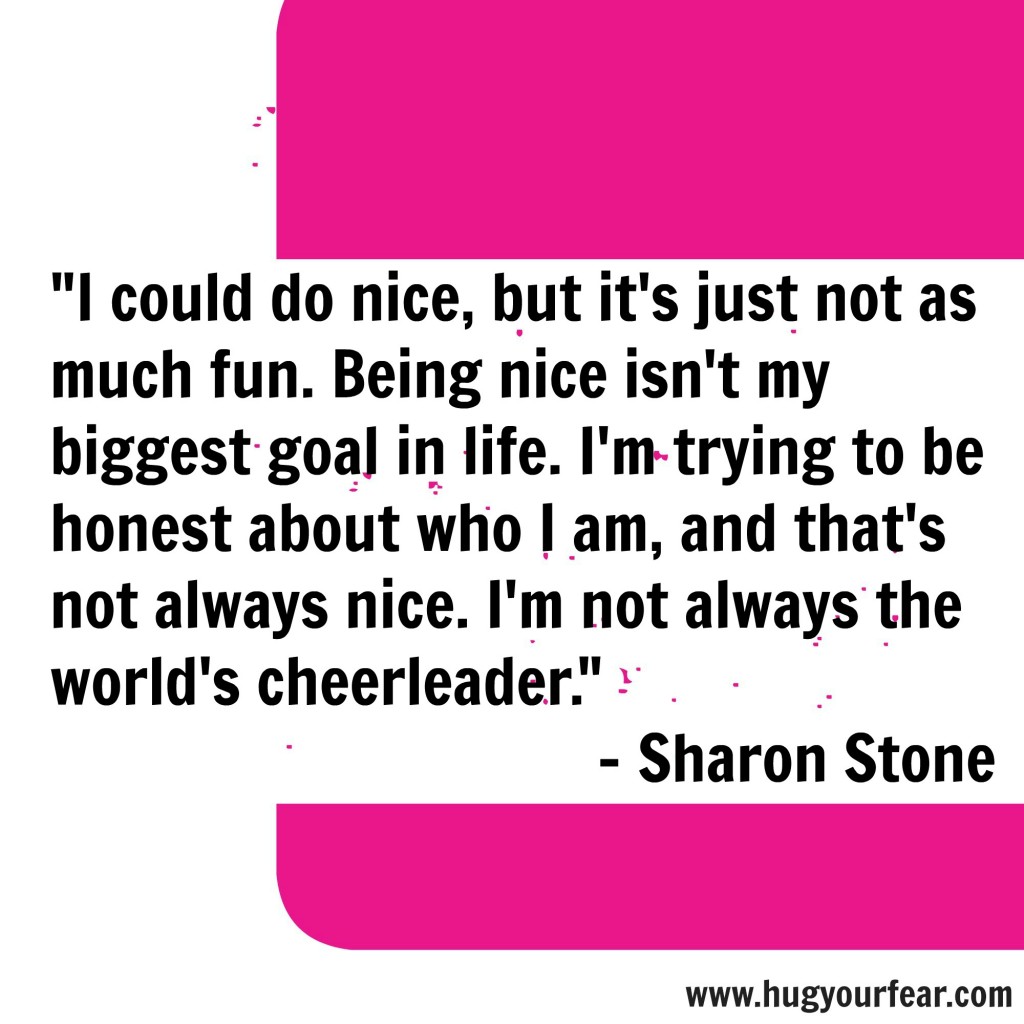Are you the perpetual “nice” boy or girl? Do you bend over backward to lend help when it’s needed? To not make waves? To smooth things over so other people are comfortable? To ignore or downplay your anger to spare someone else’s feelings? To keep your mouth shut when you disagree? How’s that working for you? Really think about it.
If you answered “It’s not”, welcome to my world. Over the past couple of years, I’ve been slowly coming to the conclusion that being “nice” sucks!
Being “nice” is not to be confused with being a kind and compassionate person; it’s more about putting on a smiling mask that hides your true self, desires, ideas, needs, emotions and opinions. It’s about putting others first in a way that hurts yourself.
Being “nice”:
- robs you of a personality
- makes you an easy target for users, abusers and manipulators
- stunts your growth as a human
- keeps you from your happiness
- can cause depression and/or physical ailments that you can’t explain
- prevents you from asserting yourself and your rights
- makes it harder to really connect with people
- nurtures self-doubt and self-hate
I could go on, but you get the point. Being “nice” is a dangerous way to be. So why do we do it?
Programming and fear.
Let’s unpack these for a bit. By programming I mean how you were trained as a child by your family, teachers, religious authorities and societal messages.
When we were young, we were very impressionable. We believed what the big people around us told us. Even more insidious than what we heard, we also believed what we observed. No words necessary. We were receptive and able to connect the dots.
If we saw our mother not making a fuss after being abused by our father, we infer that this is the appropriate reaction to make. If we were rewarded with love and attention when we were smiling and punished when we got angry or cried, we learned to slap a smile on our face and push anything else back inside. We picked up the messages subtly placed all around us that women are supposed to be nice and to be otherwise would mean to risk rejection or getting the “bitch” label. We learned to keep quiet and not make waves. It was safer that way.
As we grow into adults, unless questioned, this programming comes along with us. We get to the point where we no longer even know who our real self is. We’ve plastered on our smile for so long and so often, ignored our true instincts so much that we’re not even sure who we are or what we want. Being “nice” has become a way of life. Our friends and families know the smile, but not so much who we really are inside.
This unquestioned programming leads to fear. We’ve been this illusion of a self for so long, that once we realize the programming isn’t working we set out to separate who we are from the smile. We get glimmers here and there of a true self peeking out from behind the heavy curtain of shame and doubt. We start looking at ourselves differently, questioning some things in our minds and feeling a little freer.
But being who we are is just one piece of the puzzle. Once we know who we are, we have to share it. Being who we are and keeping it to ourselves is not enough. That’s when the fear and doubt really set in:
- What if the real me is rejected?
- What if I get called a bitch or difficult if I speak up?
- What if I can’t control my anger and just lose it?
- What if I never stop being angry once I release my feelings?
- What if I hurt someone’s feelings and they fall apart?
- What if the people I love don’t love me anymore?
Scary thoughts, no doubt. And I’m sure you can add a few more to the list. When being terrorized by your own fears and doubts, it’s easy to just turn back and consider being yourself not worth the effort. It’s easy to convince yourself that being “nice” is not such a bad thing and that there are worse ways to be.
Forget easy. Being “nice” only works if you ignore the damage you’re doing to yourself, your life and your relationships. Being “nice” means being fake. Being “nice” means people never get to experience the amazingness that is you – flaws and all. Being “nice” means setting yourself up for years of internal angst that will peek out at you from time to time, regardless of how much you try to ignore it.
So how do we stop being “nice”? I would be lying to you if I said that there were 5 easy steps to stop being “nice” for good. The more I live, the more I’m finding that most change happens progressively, one step at a time repeated over and over. As a recovering “nice” girl, here are seven progressive steps that I’ve taken and continue to take (some daily) that have cracked my “nice” façade.
Take a trip to your past to understand your programming.
I’ve found it helpful to understand how I was affected by childhood and religious programming to be “nice”. Don’t dwell there though; just reflect enough to understand how you got to this place.
Understand why being nice doesn’t work for you.
You need to pull the blinders away from your eyes and get really honest about how being nice has harmed you over the years. If you’re not clear on this, it can be easy to convince yourself that being “nice” isn’t so bad especially when you make attempts to be more of your true self.
Know yourself, accept yourself, love yourself
Find ways to get to know who you really are. This takes time, patience and care. As one of my favorite teachers, Iyanla Vanzant says, “You have to do the work.” The more you are able to know who you are, what makes you tick, your interests and quirks, and then find a way to make peace with them, love will follow. I’ve always believed that love was a verb. Or maybe I heard it somewhere and it just seeped into my brain. If saying you love yourself umpteen times in the mirror doesn’t work for you (it didn’t for me), try loving yourself with your actions. How you treat and talk to and about yourself matters. It’s hard to share who you are and be your real self when you’re unsure of who you are or hate yourself. For extra help, Vishnu (of Visnhu’s Virtues) has a wonderful free guide to help you learn how to practice self-love here .
Practice. Practice. Practice.
Being your real self is a daily practice, especially for reformed “nice” people like us who have lots of training in hiding. Be kind to yourself when you temporarily use your mask after you’ve declared yourself done with being too “nice.” You will be too nice as you learn how to be more of yourself, don’t expect otherwise. “Progress over perfection.”
Learn your assertive rights
Study assertive rights list that are out there. Reading these was eye opening for me. These lists are all about learning what is and isn’t your responsibility as you relate to others, which is often hard for us “nice” people to figure out. At this point, I don’t even remember where I read them first, but search “assertive rights” on Google and many versions will pop up. “You have the right to judge if you are responsible for finding solutions to other people’s problems” is an appropriate recovering “nice” person message I found in a list here taken from Manuel J. Smith’s book When I Say No, I Feel Guilty. (middle note: This is an affiliate link which means if you choose to purchase this book, I will get a small commission on the sale. There is no extra cost to you though. I appreciate your support if you choose to buy.)
Prepare for the pushback
As much as you’ve been programmed to be “nice,” the people around you have grown accustomed to you being easy, nonthreatening and devoid of the more fiery emotions. As soon as you start to speak up or take a stand, it’s very like (VERY LIKELY) that you will receive push back from the people around you. It might be subtle and it might be overt, but it will likely come so be prepared. Do you have someone you can run things by or get support from who is not afraid of who you really are? If so, go to them when you need some reassurance. If they can’t help or you don’t have anyone that fits the bill, start a journal or see a therapist or send me a note. Find some way to get some support to help reassure you and to make sure that you don’t let people talk you out of being the real you just to make themselves more comfortable.
One gray step at a time
Change is scary. Especially when you have no concept of what’s on the other side. It can be so scary that instead of learning how to sit in that gray space between what was and what will be, we just turn back around and settle with the “devil we know.” Find ways to deal with the uncertainty. Meditate. Write. Listen to music. Talk to someone supportive. Remind yourself why you’re making this change. Read an inspiring book. Doesn’t matter what you do as long as it helps you stay the course.
I’ve practiced and still practice all of these things and while I still have too nice moments, I am way less “nice” than I used to be. Whatever you do, just remember that change takes time and consistent practice. But making the change from:
the “nice” person who does what everyone expects, is never angry and lets others decide their fate
TO
the real person who knows who they are, loves and accepts themselves as they are and takes steps to speak their truth and live life in a way that makes them proud and happy is more than worth it and I hope you’re choosing the latter path more and more everyday.
I’d love to hear if this resonated with you in any way. Are you a “nice” girl or boy looking to break out of that pattern? Are you a reformed “nice” girl or boy who is taking steps to be more true to yourself? Share your story in the comments below or send me a personal note here. And if you know a fellow “nice” person who might benefit from this post, please share it on your favorite social media platform or send it to them by email.
Until next time!
Varonica 🙂
If you liked this post, you might also like:
5 Easy Ways to Make Fear Less Scary and Take Steps towards Your Dreams
5 Ways to Make Your Fear Worse & How to Turn it Around




Great post! As you know, I am also in ‘nice girl’ recovery. I definitely found it hard to break the pattern in the beginning, but once I started asserting myself and realised I hadn’t died as a result, it got much easier.
Having met more people like the old me recently, I’ve come to understand why being nice didn’t get me anywhere; it can actually be quite annoying when people are trying to please you all the time and at times I found it can even be a wee bit manipulative. It’s defo better to risk annoying people and be your true self.
By the way, it’s great to finally see there’s at least one other person In the world who knows how to use the word ‘infer’. For that, I thank you!
Thanks, Louise! I’m glad to be in “nice girl” recovery with you! And that’s funny about using “infer”.
Yeahh, I go to work every time scared to be myself. I can’t seem to get a grip on who I truly am because I’m scared of how great I can be. I come from a past where I’ve always had people around me help me with EVERYTHING in life and I’m so freakin tired of it! Life is not worth living unless you can be true to yourself and the people around you. No one benefits from fake people. I’m just so done with going to work with this burden of feeling that I feel every time I work there. My family have no idea who I truly am and sure they’re all “nice” people but that’s not who I am. I’m done crying every time I get off work and I’m done living a life of misery and escape, I just want to do me and for anybody reading right now take my advice, find who you are and no matter how hard it may be, it’s worth it.
Thanks for sharing, Joey! It is so important to take steps to be your true self and assert your power and it looks like you are on your way to doing that. One step at a time. I’m rooting for you!